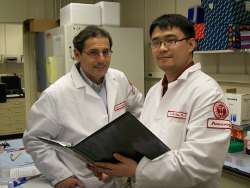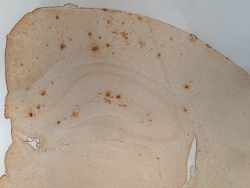Diet high in methionine could increase risk of Alzheimers
|
A diet rich in methionine, an amino acid typically found in red meats, fish, beans, eggs, garlic, lentils, onions, yogurt and seeds, can possibly increase the risk of developing Alzheimer’s disease, according to a study by Temple researchers. |
|
|
The researchers published their findings, titled “Diet-induced hyperhomocysteinemia increases Amyloid-β formation and deposition in a mouse model of Alzheimer’s disease,” in the journal Current Alzheimer Research.
“When methionine reaches too high a level, our body tries to protect itself by transforming it into a particular amino acid called homocysteine,” said lead researcher Domenico Praticò, an associate professor of pharmacology in the School of Medicine. |
 photo by Preston M. Moretz/Temple University
Lead researcher Domenico Praticò, associate professor of pharmacology in the School of Medicine, with Postdoctoral student Jia-Min Zhuo. Related News Story
|
 Temple University Department of Pharmacology
A brain sample taken from mice used in the study shows dark spots consistent with amyloid plaque, indicative of the progression of Alzheimer’s disease. Mice fed diets rich in methionine had an increased level of homocysteine and up to 40 percent more amyloid plaque in their brains. |
Using a seven-month old mouse model of the disease, they fed one group an eight-month diet of regular food and another group a diet high in methionine. The mice were then tested at 15 months of age — the equivalent of a 70-year-old human. “We found that the mice with the normal diet had normal homocysteine levels, but the mice with the high methionine diet had significantly increased levels of homocysteine, very similar to human subjects with hyperhomocysteinemia,” said Praticò. “The group with the high methionine diet also had up to 40 percent more amyloid plaque in their brains, which is a measurement of how much Alzheimer’s disease has developed. |
|
The researchers also examined capacity to learn a new task and found it diminished in the group with the diet high in methionine. Still, Praticò emphasized, methionine is an essential amino acid for the human body and In addition to Praticò, other researchers working on the study included Jia-Min Zhuo and Hong Wang from Temple’s Department of Pharmacology, Thomas J. Gould and George S. Portugal from Temple’s Department of Psychology, and Warren D. Kruger from the Fox Chase Cancer Center. The study was funded by grants from the National Institute of Health and the Alzheimer’s Association, in addition to support from Pennsylvania Commonwealth through the Fox Chase Cancer Center. |
|